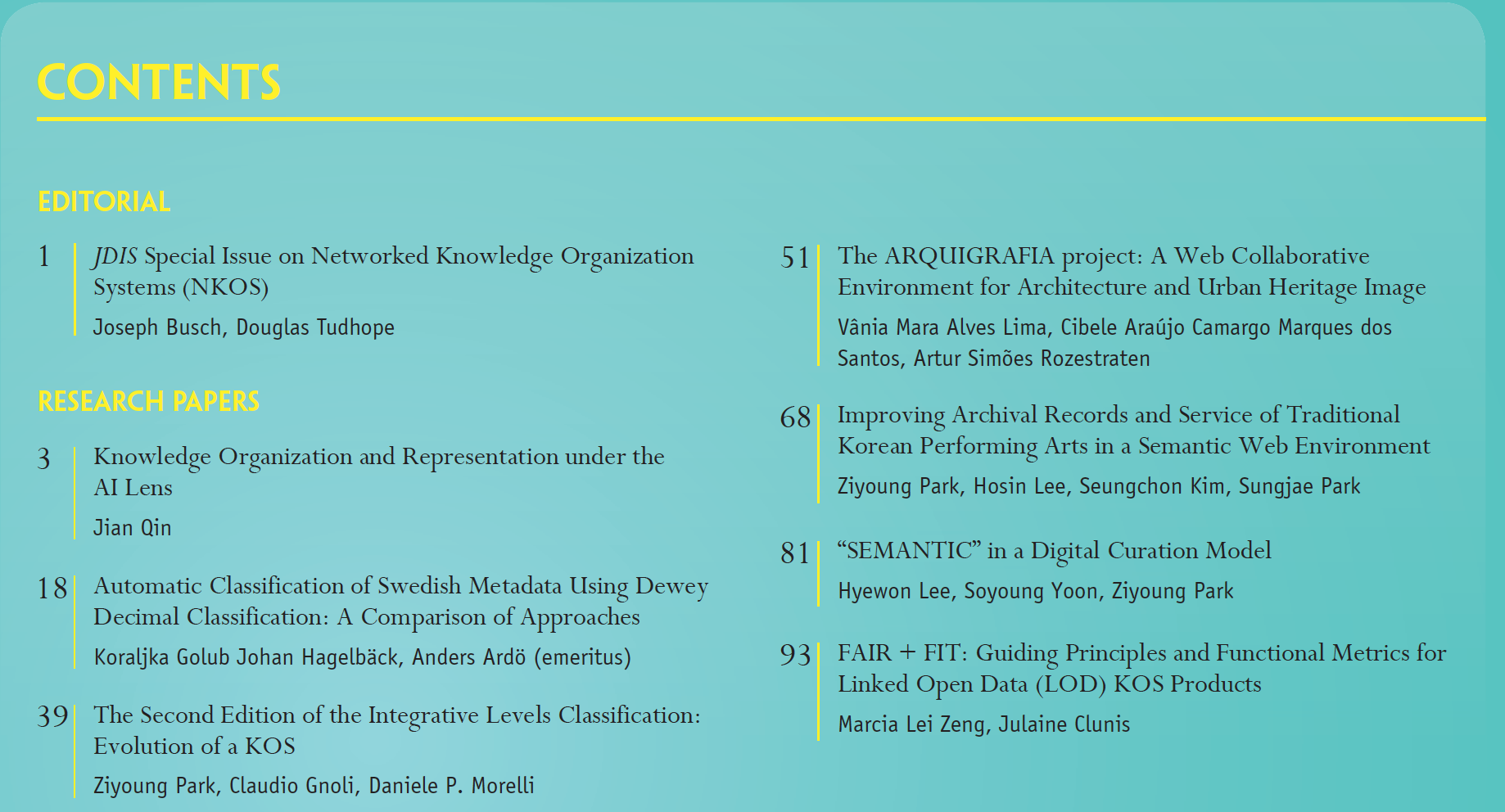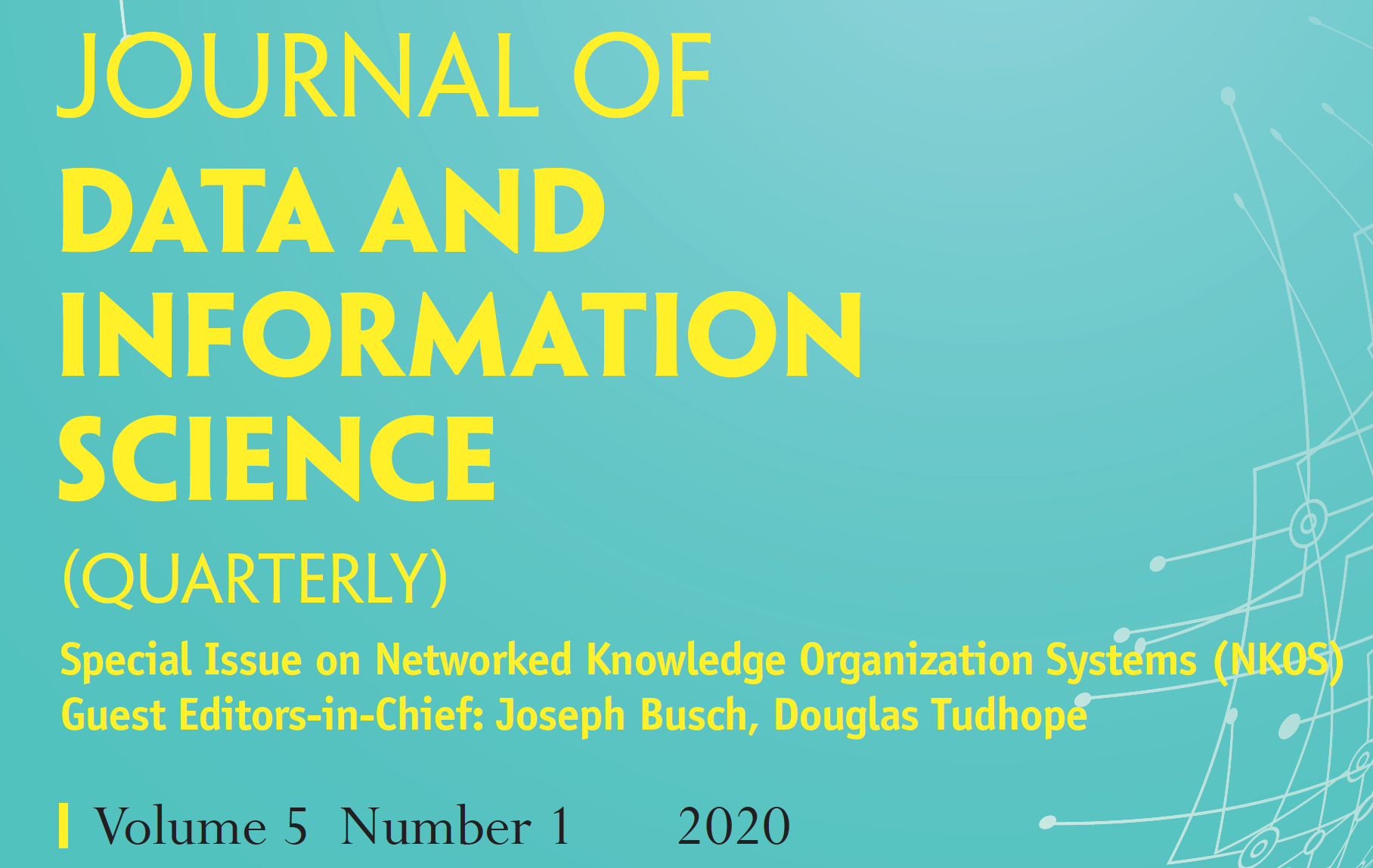Overview| Program Schedule | DCMI 2019 Conference | NKOS Home
Guest Editors-in-Chief: |
 |
NKOS 2019 Overview
NKOS is devoted to the discussion of the functional and data model for enabling knowledge organization systems/services (KOS), such as classification systems, thesauri, gazetteers, and ontologies, as networked interactive information services to support the description and retrieval of diverse information resources through the Internet. NKOS workshops have been held since 1997 in conjunction with related professional meetings in the U.S., Europe and Asia. The purpose of the workshops is to bring together KOS researchers and practitioners to share work on projects, good practices and innovations, and to discuss and critique this work. Workshops focus on topics including domain modeling, terminology development, validation, automated indexing, annotation and enrichment, and ethics.
Joseph Busch and Douglas Tudhope. “JDIS Special Issue on Networked Knowledge Organization Systems (NKOS).” Journal of Data and Information Science, vol.5, no.1, 2020, pp. 1–2. DOI: 10.2478/jdis-2020-0001. (Online)
The program for the 2019 Seoul Workshop will include:
Keynote Presentation:
.
Jian Qin. “Paradigmatic Similarities in Knowledge Representation between AI and Ontological Systems” (Presentation PPT)
"Knowledge Organization and Representation under the AI Lens" Journal of Data and Information Science, vol.5, no.1, 2020, pp. 3–17. (Full paper)
Submitted and reviewed presentations (with Full papers published in the special issue of JDIS in 2020-04):
· Joseph Busch. “Developing a Health Policy Domain Model for the Robert Wood Johnson Foundation” (Presentation PPT)
· Marcia Zeng and Julaine Clunis. “Functional Metrics for Linked Open Data (LOD) KOS Products” (Presentation PPT)
"FAIR + FIT: Guiding Principles and Functional Metrics for Linked Open Data (LOD) KOS Products" Journal of Data and Information Science, vol.5, no.1, 2020, pp. 93–118. (Full paper)
· Andreas Koller. “How to Extract Hidden Information and 'Aboutness' from Text Using SKOS, Ontologies, Corpus Analysis and Linked Data” (Presentation PPT)
· Sonia Pascua, Jane Greenberg, Peter Logan, and Joan Boone. “SKOS of the 1910 Library of Congress Subject Heading for the Transformation of the Keywords to Controlled Vocabulary of the Nineteenth-Century Encyclopedia Britannica” (Presentation PPT)
· Minjuan Liu and Yao Lu. “A Contrastive Study of Agricultural Thesaurus”
Golub, Koraljka, Johan Hagelbäck, and Anders Ardö. “Automatic Classification of Swedish Metadata Using Dewey Decimal Classification: A Comparison of Approaches.” Journal of Data and Information Science, vol.5, no.1, 2020, pp. 18–38. (Full paper)
Submitted and reviewed short presentations:
· Vânia Mara Alves Lima, Cibele de Araújo Camargo Marques dos Santos, and Artur Simões Rozestraten. “The Arquigrafia Project” (Presentation PPT)
"The ARQUIGRAFIA project: A Web Collaborative Environment for Architecture and Urban Heritage Image " Journal of Data and Information Science, vol.5, no.1, 2020, pp.51–67. (Full paper)
· Ziyoung Park, Claudio Gnoli, and Daniele P. Morelli. "The Second Edition of the Integrative Levels Classification: Evolution of a KOS" (Presentation PPT)
"The Second Edition of the Integrative Levels Classification: Evolution of a KOS" Journal of Data and Information Science, vol.5, no.1, 2020, pp. 39–50. (Full paper)
· Ziyoung Park, Hosin Lee, Seungchon Kim, Sungjae Park, Dasom Jung, Seunghee Son, and Yoonwhan Kim. “Improving Archival Records of Traditional Korean Performing Arts in a Semantic Web Environment” (Presentation PPT)
"Improving Archival Records and Service of Traditional Korean Performing Arts in a Semantic Web Environment" Journal of Data and Information Science, vol.5, no.1, 2020, pp. 68–80. (Full paper)
· Hyewon Lee, Soyoung Yoon, and Ziyoung Park. “A Digital Curation Model Focused on Semantic Enrichment” (Presentation PPT)
"“SEMANTIC” in a Digital Curation Model" Journal of Data and Information Science, vol.5, no.1, 2020, pp. 81–92. (Full paper)
Call for Presentations and Demos
The 2019 NKOS Workshop will take place on Wednesday, September 25, 2019 as part of DCMI 2019 Conference to be held at the Korean National Library in Seoul. This workshop builds on the well-attended NKOS workshops at previous ICADL, ECDL, TPDL, JCDL, and Dublin Core DCMI conferences (please see NKOS website for details).
Important Dates
Submission deadline: June 15, 2019
May 31, 2019
Notification of acceptance: Friday, June 28, 2019
Proposals are invited for the following:
a) Presentations (Proposal length: maximum 1000 words)
Typically 20 minutes plus discussion time, potentially longer if warranted, on work related to the themes of the workshop (see below). There is also an option for a short 5 minute Project Report Presentation.b) Demos and Project Reports (Proposal length: maximum 500 words)
Demonstrations on work related to the themes of the workshop (see below)
Please email proposals (maximum 1000 words for Presentations and 500 words for Demos and Project Reports, including aims, methods, main findings and underlying work, relevance to the themes of workshop) to Joseph Busch (jbusch@taxonomystrategies.com).
Proposals will be peer-reviewed by the program committee. At least one presentation author needs to register for the workshop (this is a strict requirement).
After the workshop, copies of both proposals and presentations will be made available on the workshop website as well as be subject to the DCMI copyright provisions. Presentations from the workshop may be encouraged to be submitted as extended papers for a peer reviewed journal publication.
Themes for the NKOS Workshop
Themes for the NKOS Workshop
- Domain Modeling. Modeling of pertinent real-world concepts needed in a KOS such as people, organizations, locations, events, products, services, content, etc.
- Terminology Development. Encoding concepts and relationships as the basis for reasoning rules, for example, to enable language and concept switching
- Validation. Using quantitative and qualitative methods to demonstrate KOS usability and usefulness
- Governance. Enabling KOS change management in simple and complex distributed environments
- Automated Indexing. Using and evaluating KOS-based indexing, classification, entity-extraction, clustering, and other information retrieval methods
- Annotation and Enrichment. Utilizing KOS to annotate and enrich different types of content collections and communities
- Ethics. Unintended consequences of establishing and promulgating culture-bound KOS as standards for organizing and accessing content collections
Program Committee
Program Committee (Representing DCMI and ISKO societies)
- Joseph Busch (jbusch@taxonomystrategies.com), Taxonomy Strategies
- Koraljka Golub (koraljka.golub@lnu.se), Linnaeus University
- Margie Hllava (mhlava@accessinn.com), Access Innovations
- Philipp Mayr (philipp.mayr-schlegel@gesis.org), GESIS – Leibniz-Institute for the Social Sciences
- Ziyoung Park 朴志英 (zgpark@hansung.ac.kr), Hansung University
- Jian Qin (jqin@syr.edu), Syracuse University
- Douglas Tudhope (douglas.tudhope@southwales.ac.uk), University of South Wales
- Marcia Zeng (mzeng@kent.edu), Kent State University
NKOS (Networked Knowledge Organization Systems) is an ad hoc work group of more than 300 international experts and implementers of knowledge organization systems. NKOS is devoted to enabling knowledge organization systems/services (KOS), such as classification systems, thesauri, gazetteers, and ontologies, as networked, interactive information services to support the description and retrieval of diverse information resources through the Internet.
[Ref: Links to all NKOS workshops materials (since 1997) || An archive containing details of European NKOS Workshops]
Page updated 2020-04-18, add JDIS Special Issue PDF files.
![]()
This work is licensed under a Creative Commons Attribution-NonCommercial-NoDerivs 3.0 Unported License.
Back to NKOS home
